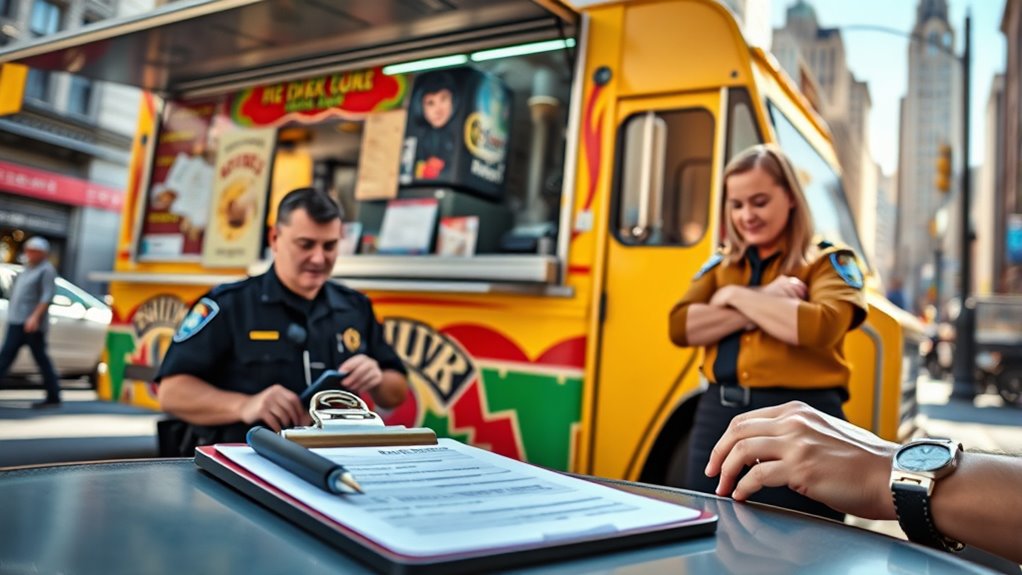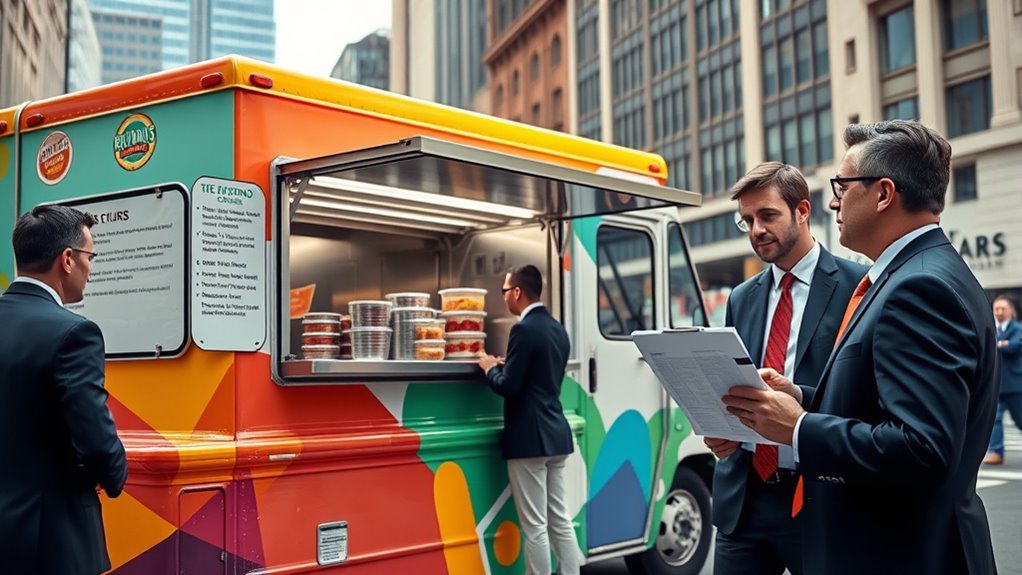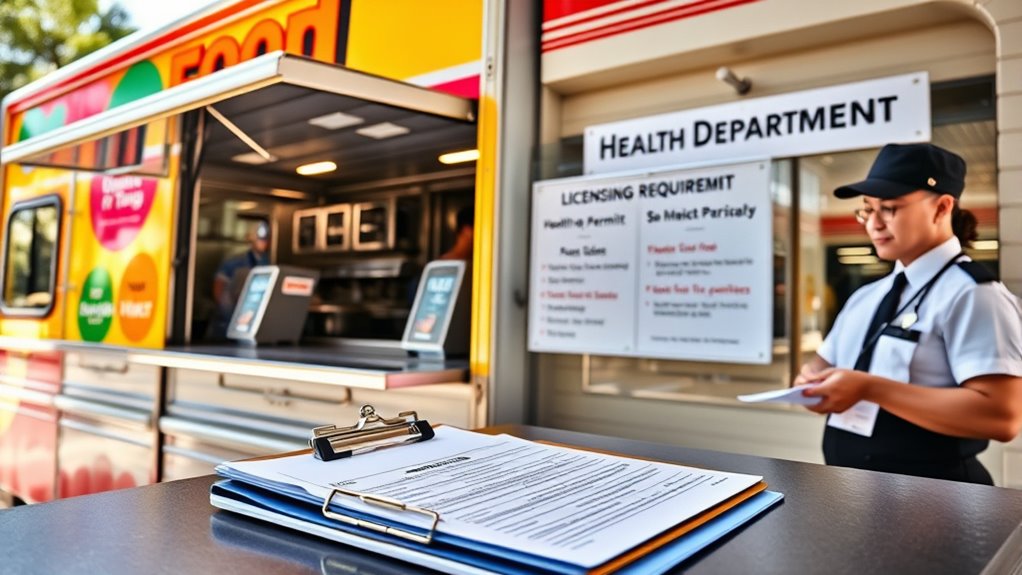To navigate food truck licensing and permits, start by researching local, state, and federal regulations affecting your area. Secure a business license and obtain necessary food service permits by passing health inspections and meeting safety standards. Make sure you have vehicle permits and adhere to zoning, parking, and location rules. Stay organized with your permits and certifications, and keep everything current to avoid fines or shutdowns. Exploring these steps further will help you stay compliant and prepared for success.
Key Takeaways
- Research local licensing requirements and permits specific to your city and state before starting operations.
- Complete and submit all necessary applications, paying fees and providing documentation like proof of insurance and ID.
- Obtain health and food service permits by passing health inspections that verify compliance with safety and sanitation standards.
- Secure parking and zoning permits to operate legally at designated locations and avoid fines or towing.
- Maintain organized records, stay updated on regulations, and renew permits promptly to ensure ongoing compliance and business success.
Understanding Local and State Regulations

Understanding local and state regulations is essential to legally operate your food truck. These rules guide everything from menu customization to branding strategies, ensuring your business aligns with legal standards. Regulations often specify health and safety codes, which impact how you prepare and serve food, as well as how you present your brand on signage and packaging. You’ll need to research specific requirements for your city and state, including permits, licensing, and zoning laws. Ignoring these regulations can lead to fines or shutdowns, so staying informed is critical. By understanding and complying with local and state rules, you can confidently develop your menu and branding strategies, knowing you’re operating within the law and setting a strong foundation for your food truck’s success. Resources and tools can help you stay updated on any regulatory changes that may affect your business.
Securing a Business License

Have you secured a business license yet? This step is essential for legally operating your food truck and establishing your brand. Without it, you risk fines or shutdowns. To streamline the process, consider how your food truck branding and social media promotion can help attract attention and make your license application smoother. Here’s a quick overview:
| Step | Details |
|---|---|
| Research | Find local licensing requirements. |
| Application | Fill out the necessary forms. |
| Documentation | Prepare proof of insurance, ID, and permits. |
| Fees | Pay applicable fees. |
| Follow-up | Confirm approval before launching. |
Securing your license is the foundation for successful food truck branding and marketing. Get it right, and you’ll be ready to hit the streets with confidence. Understanding licensing requirements is crucial to avoiding delays and ensuring compliance.
Obtaining Food Service Permits

To operate your food truck legally, you need to obtain the proper food service permits from your local health department. You’ll have to meet specific requirements and prepare for inspections to guarantee your truck complies with health and safety standards. Once you pass these inspections, you’ll be approved to serve food to customers confidently and safely. Additionally, understanding grocery savings strategies can help you cut costs on ingredients and supplies, making your food truck business more profitable.
Local Health Department Requirements
Getting a food service permit from your local health department is an essential step before launching your food truck. This permit guarantees your operation meets health standards and keeps customers safe. To obtain it, you’ll need to submit an application, pass an inspection, and follow specific food safety rules. Keep in mind, your health department may also have additional requirements that align with local regulations.
Remember, a well-branded food truck and strong social media marketing can attract customers, but meeting health standards builds trust.
- Complete all necessary paperwork promptly
- Prepare your truck for inspection with proper sanitation
- Follow food safety protocols strictly
- Keep records of maintenance and training
Inspection and Compliance Process
Wondering what the inspection and compliance process involves when obtaining your food service permit? During inspections, health officials evaluate your food truck’s cleanliness, food storage, and safety procedures. They ensure your setup meets local health codes, which is essential for maintaining food safety standards. As you prepare, consider how your food truck branding can attract customer engagement, making your truck memorable and inviting. Be ready to demonstrate proper food handling practices and sanitation routines. The process may include a review of your menu, equipment, and operational procedures. Once you pass inspections, you’ll receive your permit, allowing you to focus on serving great food and building customer loyalty. Staying compliant not only keeps you legal but also boosts your reputation and customer trust. Understanding the importance of food safety standards can further help ensure a successful inspection process.
Meeting Health Department Requirements

To keep your food truck compliant, you need to meet specific health department standards for food safety. This involves passing inspections and obtaining the necessary certifications. Understanding these requirements helps you avoid delays and guarantees your business runs smoothly.
Food Safety Standards Compliance
Ensuring your food truck meets health department requirements is essential for maintaining food safety standards and passing inspections. You need to focus on proper food storage and allergen labeling to keep customers safe. Proper food storage involves keeping raw and cooked foods separate, maintaining correct temperatures, and preventing cross-contamination. Additionally, accurate allergen labeling helps customers identify potential allergens in your menu items, reducing health risks. To stay compliant: – Store perishable items at appropriate temperatures – Label all ingredients with common allergens – Clean and sanitize surfaces regularly – Monitor food temperatures consistently. Regularly monitor food temperatures using calibrated thermometers to ensure safety and compliance.
Inspection and Certification Processes
Are you prepared for the inspection process? It’s a vital step to meet health department requirements and guarantee your food truck passes with flying colors. During inspections, health officials evaluate cleanliness, food safety standards, and proper food handling. To boost customer engagement, showcase your food truck branding by maintaining an inviting, clean environment. Use the table below to understand typical inspection categories:
| Category | Focus | Tips |
|---|---|---|
| Food Safety Standards | Proper storage, temperature control | Regularly check equipment |
| Cleanliness | Sanitation of surfaces and utensils | Schedule routine deep cleans |
| Certification | Proper documentation and licenses | Keep all permits accessible |
Preparing thoroughly helps you stay confident and ready to impress inspectors—and future customers. Additionally, understanding relationships within your team and with customers can promote a positive environment during inspections.
Passing Food Safety Inspections

Passing food safety inspections is essential for operating a food truck legally and maintaining customer trust. You need to guarantee your truck meets health standards, including proper food labeling and waste disposal practices. Here’s what to focus on:
- Keep food labels clear and accurate to prevent confusion
- Store perishable items at the right temperatures
- Properly dispose of waste to avoid contamination
- Maintain a clean, sanitized truck environment
- Regular cleaning and equipment maintenance ensure ongoing compliance and prevent issues during inspections.
Regularly check your equipment and documentation to stay compliant. Pay attention to details like food labeling for allergens and expiration dates. Waste disposal should be systematic, preventing pests and health hazards. By prioritizing these areas, you’ll pass inspections smoothly and keep your customers safe and satisfied. Remember, staying proactive is key to avoiding violations and keeping your food truck on the road.
Registering Your Food Truck With Authorities

Registering your food truck with the appropriate authorities is an essential step before hitting the road. This process guarantees your food truck complies with local regulations and helps establish your food truck branding. You’ll need to submit necessary documentation, such as proof of insurance and safety inspections, to the relevant agencies. Proper registration also involves keeping up with equipment maintenance, which is vital for safety and compliance. When your truck is officially registered, it’s easier to navigate permits and avoid fines. Make sure to stay organized and update your registration as needed. This step not only legitimizes your business but also builds trust with customers and authorities alike. Additionally, understanding the importance of projector technology can help you present your menu and branding effectively during promotional events. Once registered, you’re ready to focus on serving great food confidently.
Acquiring Vehicle Permits and Licenses

After registering your food truck with the proper authorities, the next step is to obtain the necessary vehicle permits and licenses. You’ll need to guarantee your vehicle registration is current, which may involve updating or renewing your registration periodically. This process confirms your truck meets safety and emission standards. To keep everything compliant, be aware of permit renewal deadlines to avoid fines or delays. Ensuring your vehicle’s regulatory compliance involves staying informed about local regulations and standards for food trucks. Here are some key steps: – Apply for a commercial vehicle permit specific to food trucks – Check if your state requires special licensing or inspection – Keep track of permit renewal dates to maintain compliance – Ensure your vehicle registration is up to date to avoid legal issues Staying on top of permits and registration not only keeps your truck legal but also smooths your path to success.
Complying With Zoning and Parking Regulations

Understanding and complying with zoning and parking regulations is essential to keep your food truck operating legally and smoothly. Zoning restrictions determine where you can set up your truck, often limiting locations to designated commercial or food service zones. Parking regulations specify how long you can park in a spot, whether you need permits, and any restrictions on street or lot parking. Ignoring these rules can lead to fines, towing, or even losing your operating license. Always check local ordinances before parking your truck, and obtain any necessary parking permits. Proper location scouting is crucial for identifying suitable operating areas that meet all regulations. By staying informed about zoning restrictions and parking regulations, you ensure your food truck runs without legal issues and maintains good relationships with communities and authorities.
Understanding Food Handler Certifications

Understanding food handler certifications is essential for operating your food truck legally and safely. You should familiarize yourself with the certification requirements and explore the available training programs. This knowledge guarantees you meet local standards and maintain high food safety practices. Additionally, understanding food safety practices ensures comprehensive compliance and protects customer health.
Certification Requirements Overview
Have you ever wondered what it takes to serve food legally from a food truck? Certification requirements are a key part of that process. You’ll need to obtain a food handler certification to guarantee you understand safe food practices. This certification confirms you meet health department standards and helps build trust with your customers. Keep in mind, different states may have specific requirements, so it’s essential to verify local rules. Ensuring proper food safety training is essential to meet these standards.
Some important points to remember:
- Complete an approved food safety training course
- Pass a certification exam
- Renew your certification periodically
- Keep documentation accessible during inspections
While these certifications might seem straightforward, they play a crucial role in your food truck branding and marketing strategies, showcasing your commitment to safety and quality.
Training Program Options
Once you’ve completed your certification, exploring different training program options can help you stay current and prepared. These programs often include modules on food truck design, guaranteeing your setup meets health and safety standards. Additionally, many courses cover marketing strategies to attract more customers and boost sales. By choosing reputable training providers, you gain practical knowledge that enhances your food handler skills and improves your overall business operation. Some programs offer online courses, allowing you flexibility while learning essential safety protocols and efficient food truck design tips. Staying updated through these options helps you adapt to evolving regulations and customer expectations. Incorporating best practices for food safety into your training ensures compliance and builds customer trust. Ultimately, well-rounded training supports your success in the competitive food truck industry and ensures you maintain licensing requirements.
Maintaining Compliance and Keeping Permits Up to Date

Staying compliant with food truck regulations requires ongoing effort to keep permits current and adhere to evolving rules. Regularly review local regulations and renewal deadlines to avoid fines or shutdowns. Keep your truck maintenance up to date, as inspectors often check for safety standards. Use effective marketing strategies to stay visible and attract customers, which can also support compliance by demonstrating your professionalism. Remember to: — Schedule routine truck maintenance to prevent violations — Track permit renewal dates diligently — Stay informed about new health and safety regulations — Update your marketing strategies to reflect compliance efforts — Incorporate Self Watering Plant Pots in your promotional displays to showcase eco-friendly practices and attract environmentally conscious customers.
Frequently Asked Questions
How Long Do the Licensing Processes Typically Take?
Processing times for licensing applications vary depending on your location and the specific permits you need. Typically, the application procedures can take anywhere from a few days to several weeks. You should check with local authorities to get accurate estimates. To speed up the process, make sure your application is complete and all required documents are submitted correctly. Being prepared and understanding the steps involved will help you get your food truck licensed faster.
Are There Specific Insurance Requirements for Food Trucks?
You’ll need to meet specific food truck insurance coverage requirements to operate legally. This usually includes general liability insurance to protect against accidents and property damage, and vehicle insurance for your truck. Some areas might also require workers’ compensation if you have employees. Make sure to verify local regulations because insurance requirements can vary, and having the right food truck insurance ensures you’re protected and compliant with all safety standards.
Can I Operate in Multiple Cities With One License?
You can operate in multiple cities with one license if those cities participate in permit reciprocity or offer multi-city licensing agreements. Check each city’s regulations beforehand because not all accept a single license. Some may require you to obtain separate permits for each location. It’s essential to research specific rules and confirm you meet all requirements for multi-city licensing to avoid legal issues and keep your food truck running smoothly.
What Are the Costs Associated With Licensing and Permits?
The costs associated with licensing and permits vary based on your location and truck size. You should expect a cost breakdown including permit fees, which can range from $50 to several hundred dollars, plus any necessary health and safety licenses. Some cities charge annual or renewal fees, so plan accordingly. Be sure to research local regulations to get an accurate estimate and avoid surprises when budgeting for your food truck business.
How Often Do I Need to Renew My Food Truck Permits?
Did you know that most food truck permits require renewal every 12 months? You need to stay on top of your permit renewal to avoid penalties or license expiration. Typically, you should renew your permits before they expire, usually a few weeks in advance. Check your local regulations, as renewal frequency varies by city or state, but timely renewal helps you keep your truck legally on the road and operating smoothly.
Conclusion
Guiding food truck licensing and permits requires research, preparation, and ongoing diligence. You must understand local and state regulations, secure necessary licenses, meet health standards, and stay compliant with zoning laws. You need to obtain permits, pass inspections, and maintain certifications. By staying organized, staying informed, and staying current, you’ll keep your food truck business legal, safe, and successful. Prepare, comply, and thrive—your food truck journey depends on it.









